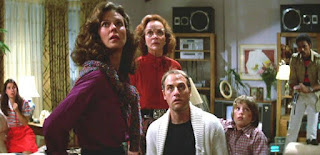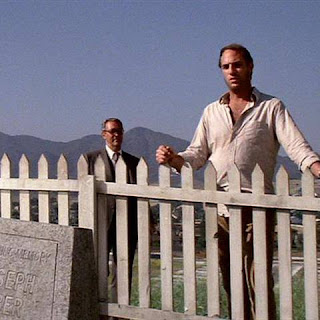The tagline on the teaser poster for Poltergeist touted it as being "the first real ghost story," which seems like an odd claim to make. Maybe the fact that this Steven Spielberg production was set in a prosaic, lookalike suburban neighborhood rather than in a stereotypical "haunted house" was what was supposed to make it more "real." More likely, I think the intent was to suggest that Poltergeist would be the first movie to take a serious look at paranormal phenomenon, making it a spiritual successor to Spielberg's Close Encounters of the Third Kind (1977). Close Encounters had treated the sort of tales that had become part of U.F.O. lore, such as ordinary people witnessing unexplained lights in the sky, not as a subject of ridicule or the stuff of tabloid headlines but imbuing them with a sense of wonder and the implication was that Poltergeist was going to treat the supernatural world with the same respect and be an Encounters of the Paranormal Kind.
With a screenplay written by Spielberg himself (based on his own story) along with writers Michael Grais and Mark Victor, the early signs of ghostly activity in the Freeling family household, located in the planned community of Cuesta Verde in California, are purely mischievous with chairs being moved and rearranged, silverware being twisted out of shape, and lights mysteriously getting brighter.
This all suggests a movie that will be taking a subtle approach and for awhile, Poltergeist actually does hold to that. The early section of Poltergeist is stocked with small moments and details that make its everyday world feel real and recognizable, whether it's JoBeth Williams' Diane Freeling singing the Miller High Life jingle to herself as she changes her kid's (Star Wars) bed sheets or Craig T. Nelson's Steve Freeling reading a Reagan biography in bed. After Diane becomes aware of the strange activities occurring in her home, the former '60s hippie turned '80s yuppie is unfazed, just looking to embrace the peaceful cosmic vibe. As she tells a concerned Steve, "It's like another side of nature. You know, a side that you and I are not qualified to understand. When you overreact, it makes what happened much too important." About forty minutes in, though, the gnarly looking tree stationed outside the bedroom window of Diane and Steve's two youngest kids comes to life in the middle of a thunderstorm, crashing its limbs through the window and attempting to gobble up eight-year-old Robbie Freeling (Oliver Robins) and as quick as that, we're off to the races.
The only thing that stops the tree from making a meal out of Robbie is a tornado (!) that touches down with pinpoint accuracy in the Freeling's backyard, tearing the tree out of its roots and sucking it up into the sky like something out of The Wizard of Oz. While Diane, Steve, and their oldest daughter Dana (Dominique Dunne) are busy with that distraction, the Freeling's youngest, Carol Anne (Heather O'Rourke), is pulled into a portal to The Other Side that opens up in the bedroom closet so, you know, things escalate quickly from the bent spoons and stacked chairs stage of this haunting and whatever semi-serious foundation the movie had laid down up to this point is out in favor of letting viewers gorge their eyeballs on state of the art FX devised by George Lucas' Industrial Light and Magic.
Previously, the makers of ghost stories - from The Haunting to The Changeling - had been guided by the belief that less was more when it came to things that go bump in the night but Poltergeist was a true ghost story for the '80s where the decade's overriding motto was "more is more."
Keeping Poltergeist's three ring supernatural circus from spinning out of control is its wonderful cast. We stay invested in the Freelings from start to finish and we always believe the truth of what's happening because this family feels so authentically real. The trio of paranormal researchers that come into the Freeling home, led by Betrice Straight as Dr. Tesh, are also instantly endearing. It would have been easy, even expected, to have at least one of these researchers turn out to be a low level creep of some kind, an opportunist who tries to leak information about all the weird happenings in the Freeling home to the National Enquirer or something. But no, they're actually all just decent, caring people. Once Dr. Tesh realizes after just one night with the Freelings that her team is over their heads ("Marty won't be coming back.") and Zelda Rubinstein's big gun psychic Tangina is called in as a heavy hitter, we see that Tangina is also just a straight up good person who is only there to help and isn't a quack or is someone out to con the Freelings. You could argue about the effectiveness of these professional's expertise ("This house is clean!") but they really do try! Across the board, I think Poltergeist features the nicest group of characters ever to be gathered in a horror movie.
The one single asshole in the whole thing is James Karen as Mr. Teague, the slime ball real estate developer who only paid to move the headstones. Fuck that guy!
One of the most enduring myths of the summer of '82 is that Steven Spielberg's E.T. was responsible for the box office failure of John Carpenter's The Thing, with the public choosing the uplifting alien tale over the nihilistic one. While I used to buy into that myself I have come to believe that Spielberg's space goblin has been an innocent scapegoat all these years. If you're going to peg The Thing's failure on any of its competitors, the movie that you really need to look at is Poltergeist.
Poltergeist and The Thing were the two big ticket horror films of the summer, both high profile, big budget, FX-laden shockers (and both from legendary horror directors!). Poltergeist arrived at the box office on June 4th, 1982, two weeks before The Thing, and it was an immediate hit, the kind of crowd pleaser that the downbeat Thing wasn't. Where U.S. Outpost 31 was stocked with surly, alienated, foul mouthed loners (God bless them all!), Poltergeist won the hearts of America with a warm, loving family. Most importantly, even though it was PG, Poltergeist still legitimately delivered on the scares. It emerged as the hot horror movie that summer in a way that The Thing couldn't match.
Sure, Poltergeist was no Texas Chain Saw Massacre (let's face it, nothing else ever has been) but Tobe Hooper had already proved with the 1979 Salem's Lot TV miniseries that he could still deliver big scares without being graphic and with Poltergeist he was able to give the hardcore horror crowd a satisfying fix while not alienating the wider mainstream audience. I'm not going to bother to wade into the ancient debate as to who really directed Poltergeist. As much as there's a powerful Spielberg vibe (why wouldn't there be?), I consider it to be a Tobe Hooper film, full stop.
My one disappointment with Poltergeist is that it didn't jump on the burgeoning 3D bandwagon! I know that was never an actual consideration on the part of anyone involved so I can't actually hold it against the movie but just the same I feel like an opportunity to change the game was missed. All love to Parasite and Friday the 13th 3D and Jaws 3D but I believe Poltergeist in 3D would have sold the format as being more than just a gimmick.
Poltergeist could have been the Avatar of its day, legitimizing 3D years ahead of time. With so many moments that are tailor made for the format, it would have looked incredible (imagine how stunning the hallway shot would have been!). I only wish that someday someone would convert it to 3D and give it a theatrical release. Yeah, I know it will never happen but it sure would be cool if it did. For a movie with such a canny sense of showmanship, 3D would have been the perfect fit.
Early on in Poltergeist, Steve Freeling is giving a guide through one of the Cuesta Verde homes, pitching a couple on life in the community with "You know, we have a saying around here...the grass is greener on every side." All three groan as soon as he says it but in America in the summer of '82, the grass kind of did feel greener on every side. Whether it was true or not, America felt like the land of plenty. We were riding high and Poltergeist was a gaudy ghost story made with the belief that, in the '80s, bigger was better.
It's not the specters on screen that make Poltergeist feel haunted now but the bittersweet awareness of time gone by. Forty years later, it lingers as a reminder of the ghosts of summers past.














No comments:
Post a Comment